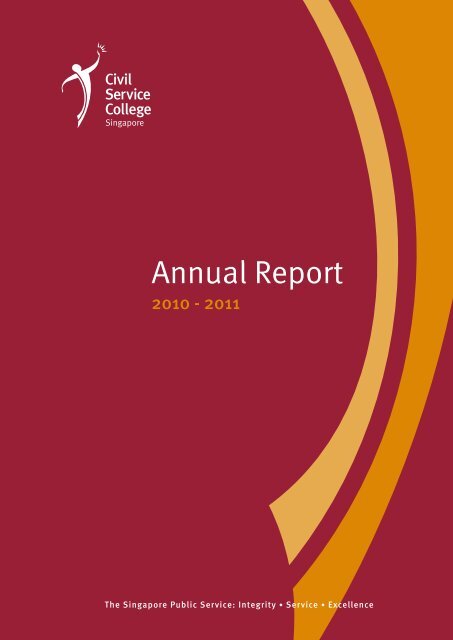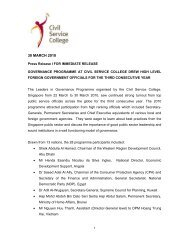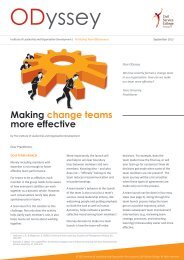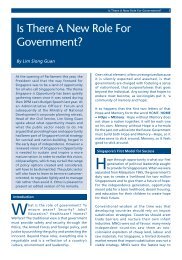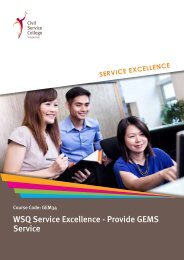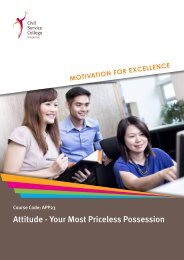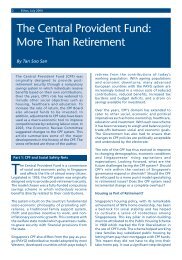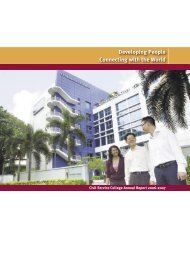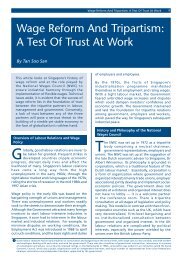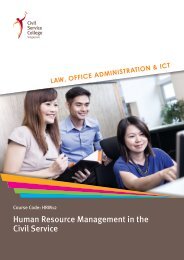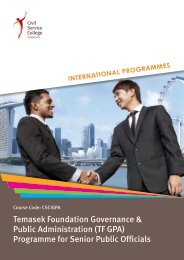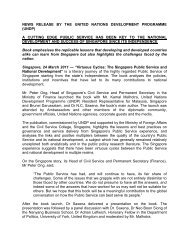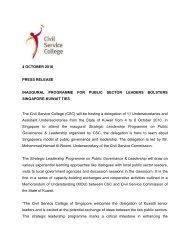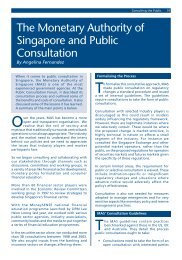2010-2011 - Civil Service College
2010-2011 - Civil Service College
2010-2011 - Civil Service College
You also want an ePaper? Increase the reach of your titles
YUMPU automatically turns print PDFs into web optimized ePapers that Google loves.
Annual Report <strong>2010</strong> - <strong>2011</strong>CIVIL SERVICE COLLEGEANNUAL REPORT FOR THE YEAR ENDED 31 MARCH <strong>2011</strong>In the opinion of the directors, the annual report of the <strong>Civil</strong> <strong>Service</strong> <strong>College</strong> is drawn up so as to presentfairly the state of affairs of the <strong>Civil</strong> <strong>Service</strong> <strong>College</strong> as at 31 March <strong>2011</strong>.Board of DirectorsName Designation (as at 31 March <strong>2011</strong>)Ms Lim Soo Hoon (Chairman)MG Chan Chun SingMs Chan Lai FungMr Chang Kuan AunMr Robin HuMr Bilahari KausikanMr Michael KohMr Benny LimMs Teresa LimProfessor Lui Pao ChuenMr Ng LangMr Phillip TanProfessor Tan Tai YongMr David WongMr Lawrence WongMs Yong Ying-IPermanent Secretary, Public <strong>Service</strong> DivisionChief of Army, Singapore Armed Forces, Ministry of Defence(stepped down wef 31 March <strong>2011</strong>)Permanent Secretary (Finance Performance), Ministry of FinanceExecutive Vice President & Chief Human Resource Officer, SingaporeExchange LimitedSenior Executive Vice President (Chinese Newspapers/ Newspaper<strong>Service</strong>s), Singapore Press Holdings LtdPermanent Secretary, Ministry of Foreign AffairsChief Executive Officer, National Heritage BoardPermanent Secretary, Ministry of Home AffairsManaging Director, IBM Singapore Pte LtdChief Scientific Adviser, Ministry of Foreign AffairsChief Executive Officer, National Parks BoardDirector, EQ Insurance LimitedVice Provost (Student Life), National University of SingaporeDeputy Group CEO, Bank of China (Hong Kong) LtdChief Executive Officer, Energy Market Authority(stepped down wef 31 March <strong>2011</strong>)Permanent Secretary, Ministry of Healthwww.cscollege.gov.sg1
Annual Report <strong>2010</strong> - <strong>2011</strong>Organisation StructureInstitute of Public Administration and ManagementTrainingDepartmentsInstitute of Policy Development<strong>Civil</strong> <strong>Service</strong> <strong>College</strong> InternationalCentre for Governance and LeadershipCentre for Leadership DevelopmentCIVILSERVICECOLLEGECentres ofExpertiseCentre for Organisation DevelopmentCentre for Public EconomicsCentre for Public CommunicationsCorporate DevelopmentCorporate<strong>Service</strong>sFinanceCapability and People Developmentwww.cscollege.gov.sg3
Centre for Leadership Development (CLD)Annual Report <strong>2010</strong> - <strong>2011</strong>CLD acts as the focal point in CSC, bringing together the different strands of leadership developmentwork in the <strong>College</strong>. In particular, CLD lends its expertise in talent assessment, leadership developmentand leadership research to support Public <strong>Service</strong> Division and public sector agencies’ needs. CLDemploys rigorous psychometric approaches to talent assessment and selection and deploys anintegrated approach to support the development of leaders at various levels.Centre for Organisation Development (COD)COD supports and assists public organisations in their pursuit of continuous improvement andsustained organisation performance. Through the delivery of carefully planned organisationdevelopment (OD) interventions and advisory services, COD aims to engage, educate and equip ODpractitioners at all levels and through them, develop the required capabilities to achieve desirableorganisational outcomes and excellence.Centre for Public Communications (CPC)CPC serves to enhance the knowledge and practice of public communications in the public sector. Itaims to build capabilities of government communicators through a holistic suite of training, researchand milestone programmes. CPC is a strategic collaboration between CSC and the Ministry ofInformation, Communications and the Arts (MICA).Corporate <strong>Service</strong>s:Corporate Development (CD)CD manages CSC’s estate and administration matters, public relations, intellectual property issues,corporate collaterals, customer service, audio-visual and information technology networks and theCSC Resource Centre. It also serves as the secretariat to the Board of Directors.FinanceFinance oversees the financial accounting and procurement functions, works with internal auditorsto evaluate the adequacy and effectiveness of internal controls in CSC and helps CSC adhere to goodgovernance practices.Capability and People Development (CPD)CPD serves as a custodian of CSC’s Mission, Vision and Values. It is responsible for human resourcemanagement, organisational development and learning, and corporate strategies for improvingorganisational performance. CPD also houses the Learning Design Unit (LDU), which was set upto deepen CSC’s core competency in learning design and to raise the quality of CSC’s methods ofinstruction. LDU promotes experimentation and adoption of learning design innovations in CSC, andprovides leadership on CSC’s philosophy and approach towards learning design.www.cscollege.gov.sg5
<strong>Civil</strong> <strong>Service</strong> <strong>College</strong>, SingaporeSenior ManagementName Designation (as at 31 March <strong>2011</strong>)Mr Lionel YeoDean & CEOMs Poon Seok YinChief Financial OfficerMs Lee Yoke PengDirector, Corporate DevelopmentMs Ong Poh ChinDirector, Capability & People DevelopmentMr Chng Kai FongDirector, Institute of Policy DevelopmentMr Roger TanDirector, Institute of Public Administration & ManagementMrs Tina TanDirector, <strong>Civil</strong> <strong>Service</strong> <strong>College</strong> InternationalMs Tan Li SanDirector, Centre for Governance & LeadershipMr Paul LimDirector, Centre for Leadership DevelopmentMr Low Chee SengDirector, Centre for Organisation DevelopmentMr Donald LowAssociate Fellow and Head, Centre for Public EconomicsMs Jaime TeongAssociate FellowMajor Shareholder of Subsidiary CompaniesAll companies that the Statutory Board has a majority stake inS/N Name of Subsidiary Company % Shareholdings in Company1 CSC International Pte. Ltd. 100%6 www.cscollege.gov.sg
Annual Report <strong>2010</strong> - <strong>2011</strong>Key AccomplishmentsTHE YEAR IN REVIEWCSC’s three corporate priorities for FY<strong>2010</strong> were: (1) position CSC as a strategic partner; (2) build up CSC’scapacity base; and (3) create a total Public <strong>Service</strong> experience for participants. CSC made significantprogress on many fronts. It developed stronger collaborations with several public agencies, remained ontrack in establishing itself as the go-to agency for consultancy projects related to organisational and peopledevelopment, and strengthened its organisational capacity through a well-established suite of professionaldevelopment programmes and resources.POSITIONING CSC AS A STRATEGIC PARTNERForging Deeper Partnerships with Public Sector AgenciesCSC is steadily becoming public agencies’ partner of choice in training and development. In FY<strong>2010</strong>,CSC not only reached out to a wide audience of public officers through open runs of training courses,its expertise was also sought by many agencies to develop customised, in-house programmes for publicofficers. An example is the Ministry of Education Future Leaders Programme Foundation Programme. CSCalso partnered the Ministry of Community Development, Youth and Sports (MCYS) to launch the MCYS-CSCSocial Strategy Lectures, a series which featured prominent thought leaders in social policy.CSC contributed to capability building throughout the Public <strong>Service</strong> by working with public sector agenciesto promote and establish various communities of practice (CoP). To develop public sector-wide organisationdevelopment (OD) capabilities and mindshare, CSC served as the CoP secretariat for a multi-agency ODcommunity. There was also a healthy demand for CSC’s consultancy services by other public agencies.For instance, CSC conducted workshops on Enterprise Risk Management for more than 700 officers fromSentosa Development Corporation, Energy Market Authority and JTC Corporation.Widening Reach to Individual Public OfficersBesides forging partnerships at the agency level, CSC extended its reach to individual public officers. Thiswas done through its commitment to continuously improve its existing training programmes to keep upwith the demand for new skills and knowledge. In FY<strong>2010</strong>, a number of new programmes were developed tocater to the diverse learning needs of a growing public sector. For example, CSC launched the 1st Energy andClimate Policy Programme to equip policy analysts with the tools and conceptual frameworks employed toassess energy and climate change trade-offs. In addition, CSC inaugurated the Applied Change Managementfor Practitioners and Change Teams programme, which focused on change management tools, frameworksand processes.Seminars, forums and conferences featuring thought-leaders and subject matter experts in various fields,such as public policy, governance, leadership and organisation development, strategic human resource andinternational relations, attracted high levels of interest. CSC also ramped up efforts to make programmesmore prominent and accessible to public agencies and officers. In FY<strong>2010</strong>, CSC started a series of seminarsand workshops entitled “Bringing Learning Closer to You”, which aimed to make learning more accessibleto public officers housed in various office clusters.www.cscollege.gov.sg7
<strong>Civil</strong> <strong>Service</strong> <strong>College</strong>, SingaporeContinuing Efforts to Boost International StandingIn FY<strong>2010</strong>, CSC continued to strengthen its international standing through strategic collaborations withforeign and local institutions. CSC International trained over 4,400 foreign officials, mainly from East Asia,South Asia, Central Asia, the Middle East and Africa. CSC further deepened its relationships with membersof the international community through the signing of a series of Memorandums of Understanding (MOUs)to contribute to capacity-building for foreign public services and institutions. Some of the MOUs signedincluded agreements between CSC and the Public Administration and <strong>Civil</strong> <strong>Service</strong> Bureau of Macao andthe Tianjin Administrative Institute.BUILDING UP CSC’S CAPACITY BASEInvesting in Professional Development of StaffIn FY<strong>2010</strong>, CSC continued to invest in the professional development of staff through a range of trainingprogrammes and sponsorships aimed at deepening core competencies. Beyond the training opportunitiespresented in officers’ professional development roadmaps, officers were strongly encouraged to exploreand experiment with new learning tools in programmes. One of CSC’s new learning tools, Kirkpatrick’s4 Levels of Evaluation, gave rise to the formulation of a set of learner-centric evaluation questions forprogrammes and seminars, which was adopted across CSC. This re-orientation of programme evaluationhelped to ascertain learning effectiveness and impact, and to sharpen design and delivery of trainingprogrammes.Growing and Safeguarding Intellectual CapitalCSC sought to grow its intellectual capital through extensive use of research papers in programmes andpublications. Ethos Insights was an example of a publication launched by CSC in FY<strong>2010</strong>. A bi-monthlybulletin, it provided a platform for CSC to showcase products and disseminate key take-aways from lecturesor programmes to a wider audience, including the academia and the private sector.In addition, CSC successfully engaged many thought leaders from diverse fields to share their knowledgein programmes and seminars. These engagements with external experts not only strengthened CSC’sintellectual capacity but also helped to grow its network beyond the Public <strong>Service</strong> and increase its profileas an institute of learning and development.CSC stepped up efforts to increase accessibility of in-house materials to staff. Leveraging technology,CSC set up The Learning Studio, a centralised repository and reference site for learning design. LIBRIS,an electronic catalogue system of CSC’s Resource Centre, was also launched to enable sharing of CSCauthoredmaterials such as case studies and audio recordings.Focusing on risk management, CSC improved copyright protection of intellectual property through theestablishment of a centralised Intellectual Property (IP) Desk which oversees policies and practices tosafeguard CSC’s IP rights.8 www.cscollege.gov.sg
Annual Report <strong>2010</strong> - <strong>2011</strong>CREATING A TOTAL PUBLIC SERVICE EXPERIENCEEngendering Shared Perspectives and IdentityCSC took deliberate steps to provide public officers with enriching experiences to reaffirm a sense of prideand affinity towards the Public <strong>Service</strong>. To educate officers on the history of the Public <strong>Service</strong> and to instila sense of pride in serving Singapore, CSC collaborated with Public <strong>Service</strong> Division to develop the Public<strong>Service</strong> Heritage Gallery, an exhibition profiling stories of public officers and showcasing the milestonesof the Public <strong>Service</strong> across the decades. A mobile version of the Gallery also went on a well-received touracross some 30 government agencies in Singapore. The tour was done in conjunction with the launchof the Public <strong>Service</strong> book, titled “Pioneers Once More: The Singapore Public <strong>Service</strong> 1959-2009”. CSCalso co-organised the Public <strong>Service</strong> Week Learning Festival and the Public <strong>Service</strong> Staff Conference. Thesewide-reaching events helped to reinforce Public <strong>Service</strong> values and strengthen the learning culture in the<strong>Service</strong>.Integrating Purposeful Reflection on Public <strong>Service</strong> ValuesIn CSC’s leadership programmes, effort was taken to integrate and facilitate discussions on Public <strong>Service</strong>ethos and values. This provided participants with opportunities to reconnect with their decision to embarkon a career in the Public <strong>Service</strong>. New sessions on Public <strong>Service</strong> ethos were incorporated into seniorlevelprogrammes such as the 8th Leaders in Administration Programme and the 17th Senior ManagementProgramme. For younger officers, CSC encouraged exploration of topics on values and ethos alongsidediscussions on Singapore’s Principles of Governance.www.cscollege.gov.sg9
<strong>Civil</strong> <strong>Service</strong> <strong>College</strong>, SingaporeOUTLOOK FOR THE NEXT FISCAL YEARFY<strong>2011</strong>Amidst rising expectations and a more volatile operating environment for governments, there is an urgentemphasis on driving productivity and building capability in the Singapore Public <strong>Service</strong>. As the primarytraining arm of the <strong>Service</strong>, CSC will strive to be available and accessible to public officers everywhereand anywhere. To this end, CSC has set out three corporate priorities for FY<strong>2011</strong>: deepening CSC’s stockof capabilities; pursuing customer-centric innovation; and preparing public officers for the emergingchallenges of governance.DEEPENING CSC’S STOCK OF CAPABILITIESReviewing Training Competency and Career Development FrameworksCSC will embark on a review of the career development of its course administrators and senior executives,and will look into streamlining work processes and creating a better fit between capabilities and aspirations.CSC will also create developmental opportunities for its officers to move beyond training administrationto learning and design consulting, and will develop its customer relations officers to take on businessdevelopment roles.Deepening Professional Development of StaffSchemes for staff, like post-course coaching, e-coaching, mentoring and shadowing, will be provided todeepen core competencies in learning design knowledge and expertise in CSC. CSC will also promotenew methods of learning through the deployment of technology in the form of digital games and mobileapplications for learning, and will continue to build internal expertise in specific areas such as curation,facilitation and coaching to support its intent to build up an internal teaching faculty.Learning from the BestCSC will embark on a number of benchmarking projects to identify and adopt best practices from domesticand international partners. The learning derived from these projects will help CSC hone its service offeringsand help the organisation excel.PURSUING CUSTOMER-CENTRIC INNOVATIONEnhancing Customer Engagement and ExperienceTo enhance the total learning experience of public officers, CSC will embark on a pilot project to betterunderstand the needs of selected customer segments and develop more learning possibilities for them. Atthe same time, CSC will continue to enhance its value to public agencies.10 www.cscollege.gov.sg
Annual Report <strong>2010</strong> - <strong>2011</strong>Leveraging Technology to Promote LearningCSC will accelerate its pace of adopting and harnessing technology to promote ubiquitous learning throughoutthe Public <strong>Service</strong>. CSC will deploy mobile devices such as iPads for marketing and training purposes. Itwill also experiment with developing mobile applications, digital and simulation games for learning. Theinception of the CSC.tv platform will help CSC extend access to knowledge and insights generated fromCSC events to a wider audience. CSC will also design and produce learning-focused content, release newpodcasts and vodcasts more regularly, and use its Facebook platform more intensively to promote eventsand solicit feedback from technologically-savvy public officers.Improving Work Processes to Increase Accessibility and EfficiencyOne of CSC’s major initiatives for FY<strong>2011</strong> is to roll out a customer engagement tracking system. This systemwill serve as a one-stop platform that provides CSC with a comprehensive and integrated overview ofits engagements with public agencies. Leveraging automation will reduce the turnaround time for CSC’scustomer service processes.Forging Closer Alignment with Singapore’s International AgendaCSC will continue to work closely with key ministries and agencies to deepen its engagements with countriesof strategic interest to Singapore. It will also strengthen and widen dealings with international organisationsand sponsoring agencies to support its international cultivation efforts.PREPARING PUBLIC OFFICERS FOR THE EMERGING CHALLENGES OF GOVERNANCEEnhancing Capability Building in the Public <strong>Service</strong>CSC will partner public agencies to develop their internal capabilities. This will be done through collaborativeefforts such as consultancy projects, customised training programmes, joint curriculum designs andsecondment of learning development specialists to head training and development functions in agencies.Injecting Values and Ethos into CurriculumCSC will integrate leadership lessons into its milestone programmes rather than conduct them as standalonemodules. It will also inject greater emphasis on the importance of public service values in theseprogrammes.Emphasising on Quality Research and Thought LeadershipCSC aims to inspire new thinking on governance by harvesting knowledge and connecting policy makersand thought leaders, with a focus on the following themes for FY<strong>2011</strong>:• Singapore’s Place in the World;• A Place in Singapore for All; and• Governance in Singapore.CSC will seek to deepen public sector capabilities and literacy in the areas of economics and leadershipdevelopment through the launch of new programmes and research initiatives. Last but not least, CSC willcontinue to invite thought leaders to share perspectives with public officers.www.cscollege.gov.sg11
<strong>Civil</strong> <strong>Service</strong> <strong>College</strong>, SingaporeFINANCIAL SUMMARYFY<strong>2010</strong>ASSETS<strong>2010</strong>S$’m2009S$’mProperty, Plant and Equipment 3 3Trade and Other Receivables 8 7Cash and Cash Equivalents 40 35Available-for-sale FinancialAssets9 11REVENUE<strong>2010</strong>S$’m2009S$’mTraining 40 36Consultancy 4 2Government Operating Grants 16 15Other Operating Income 1 1Total 60 56Total 61 54LIABILITIES<strong>2010</strong>S$’m2009S$’mTrade and Other Payables 14 11Contribution to ConsolidatedFund1 1Total 15 12CAPITAL AND RESERVES<strong>2010</strong>S$’m2009S$’mCapital and Reserves 45 44Total 45 44EXPENDITURE<strong>2010</strong>S$’m2009S$’mStaff and Related Costs 24 20Training Related Costs 20 15Maintenance, OtherProfessional <strong>Service</strong>s andOther Expenses6 6Rental and Utilities 3 3Depreciation of Property,Plant and Equipment2 2Office Supplies and Materials 1 1Contribution to ConsolidatedFund1 1Total 57 48Auditors:PricewaterhouseCoopers LLP8 Cross Street 17-00 | PWC Building | Singapore 04842412 www.cscollege.gov.sg
Annual Report <strong>2010</strong> - <strong>2011</strong>ADDITIONAL INFORMATIONPARTNERS (A Non-Exhaustive List of CSC’s Partners)• Singapore Ministries and Statutory Boards• Foreign PartnersSouth East Asia• Brunei <strong>Civil</strong> <strong>Service</strong> Institute• Royal School of Cambodia• Ministry of Economy and Finance, Cambodia• Economic and Finance Institute, Cambodia• National Institute of Public Administration,Malaysia• Office of <strong>Civil</strong> <strong>Service</strong> Commission, Thailand• <strong>Civil</strong> <strong>Service</strong> Training Institute, Thailand• National Institute of Public Administration,Indonesia• National Secretariat of the Republic of Indonesia• Ho Chi Minh National Academy of Politics andPublic Administration• Hanoi Department of Information andCommunications• Communist Party of Vietnam Central InspectorateNorth East Asia• Beijing Organization Department• China Academy of Governance• China Executive Leadership AcademyJinggangshan• China Executive Leadership AcademyPudong• China Executive Leadership AcademyYan’an• Chongqing Party School• Shenzhen Managers <strong>College</strong>• Shanghai Administrative Institute• Japan International Cooperation Agency• Korea International Cooperation Agency• Seoul Metropolitan Government• China Tianjin Administrative Institute• Liaoning Provincial Bureau of Foreign Trade& Economic Cooperation• Guangdong Institute of PublicAdministration• Shanxi Institute of Public Administration• Foreign Partners (C0nt’d)Middle East• Abu Dhabi International Centre forOrganisational Excellence• Bahrain Institute of Public Administration• <strong>Civil</strong> <strong>Service</strong> Commission Kuwait• United Arab Emirates, Prime Minister’sOffice• Abu Dhabi Tourism AuthorityAfrica• Botswana Public <strong>Service</strong> <strong>College</strong>• Department of Public <strong>Service</strong> Management,Botswana• Eastern and Southern African ManagementInstitute• Mozambique Higher Institute of PublicAdministration• Tanzania Revenue Authority• Namibia Ministry of Justice• Nigeria Federal Capital Territory• Uganda Ministry of Finance, Planning & EconomicDevelopmentOther Regions• Government of Tatarstan• Russian Academy of Public Administration• International and Other Organisations• Asian Development Bank• Business China Singapore• Cities Development Initiative for Asia• Commonwealth Secretariat• Economic Society of Singapore• Lee Kuan Yew School of Public Policy• Temasek Foundation• United Nation Centre for RegionalDevelopment• World BankSouth Asia• Bangladesh Public Administration TrainingCentre• Royal <strong>Civil</strong> <strong>Service</strong> Commission, Bhutan• Department of Personnel and Training, India• Government of the State of Karnataka, India• Lal Bahadur Shastri National Academy ofAdministration, India• Direct Tax Regional Training Institute,Bangalore, India• Office of the Prime Minister and Council ofMinisters, Nepal• Sri Lanka Institute of Development andAdministrationwww.cscollege.gov.sg13
<strong>Civil</strong> <strong>Service</strong> <strong>College</strong>, SingaporeTRAINING STATISTICS FOR FY2008 TO FY<strong>2010</strong>Total No. of Unique Local Participants45,00044,00043,96643,00042,00041,00040,00041,00640,41239,00038,000FY08 FY09 FY10Total No. of Unique International Participants4800460044004,438 4,4354200400038003,76936003400FY08 FY09 FY1014 www.cscollege.gov.sg


